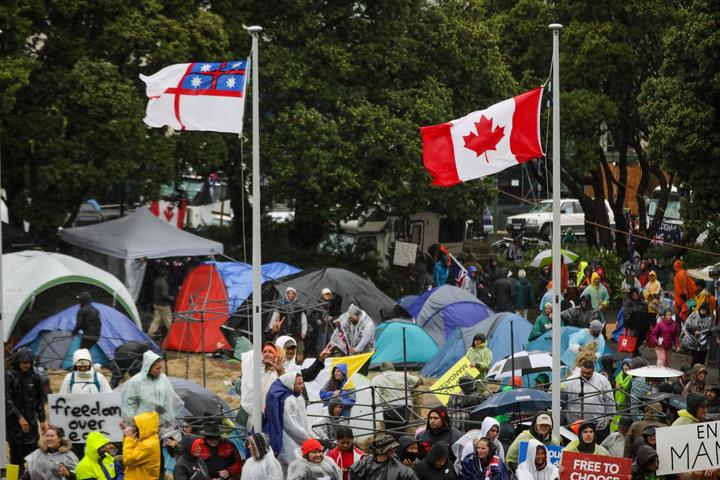ON THE OCCUPATION AT PARLIAMENT
1. New Zealand has one of the lowest rates of death from COVID in the world, and is now facing the rapid spread of the Omicron variant. Mask wearing, vaccination, vaccine mandates and contact tracing are collective responses to COVID, and collective responses to protect our lives. Our very high vaccination rates are a sign of social solidarity, and of unity across the working class for life-protecting action. Vaccine mandates protect workers.
2. The only consistent demand coming out of this occupation at parliament is against vaccine mandates. This is an anti-working-class demand. The gathering is reactionary through and through: in its demand; in the gaggle of reactionary and far-right slogans and images it collects along in its wake; in the intimidation of workers and students around Pipitea it has encouraged; and in its intervention as a mass gathering at a time when gatherings endanger our collective health. The presence of the United Tribes’ and Tino Rangatira flags in the crowd should not obscure this fundamental starting point: this is a reactionary event, and harms the cause of workers, Māori and the oppressed.
3. Freedom, in a democratic, socialist sense, is a freedom to live, to control our labour, to participate in shaping and controlling our society. The freedom this rally advocates is the mirror opposite of real freedom: it is the freedom from consequences, from caring about others, from having to participate in a collective. The ‘freedom’ anti-mandate protesters want negates the freedom of the vulnerable, the immune-compromised, the wider group. It is a slogan against life.
4. The social base of the occupation – amongst small businesspeople, traders able to camp indefinitely in Wellington, the flotsam and jetsam of alternative lifestyles and health cures, and groups of the oppressed organized against their own class by religious sects – is the classic set-up for right-wing populist and fascist organization. It has no relationship to the workers’ movement or the left, whatever the occasionally shared tactics of protest and occupation. We need to assess the protest demands, make-up and consequences before we assess the tactics. All of these are reactionary.
5. Even if not every member of the occupation is a far-rightist or fascist, the gathering has a far-right trajectory. It is peppered with far-right forces and has been identified by right-wing projects internationally as a recruiting ground. The vilely misogynistic slogans against the Prime Minister tolerated here, alongside calls for the execution of democratically-elected politicians and lurid fantasties of show trials, show the kind of political mould that is able to grow in the damp and the dark of the occupation. It is a breeding colony for the worst conspiracist, racist, anti-semitic and Trumpian hatreds. It takes its inspiration from the far-right recruiting stunt in Canada.
6. The occupation is, in other words, not ‘dumb’ but dangerous. We need not liberal scorn at the so-called stupidity of the people present and instead a careful attention to their politics.
7. This is a jactitation: a bragging, a twitching, a bandying about of words, an ostentatious show of rhetoric and threats. It is designed as a spectacle, and its organisers are happy enough to see others face the consequences for their own ends. Violence and chaotic scenes are not accidental here, but a part of the programme.
8. The Speaker’s actions – from turning on the sprinklers to playing loud music all weekend – mistake the nature of the occupation. Inconvenience will not budge spectacle driven by a committed core.
9. The contrast in policing styles between this occupation and righteous action by Māori protecting their whenua is striking, as is the hypocrisy. But calling for police action, or demanding state violence, will only push politics onto the terrain of the right. Supporting more repressive powers from the state, especially given the extraordinary circumstances of the pandemic, will not strengthen our side’s ability to organize. We are not in the business of giving tactical advice to the police, but it is a good thing there has been no violent clash on Molesworth Street this past week. The right’s organisers, keeping themselves off the scene, would welcome martyrs.
10. What happens next, however, is not best understood in the context of abstract calls for the ‘right to protest’. What of the right of students and workers to go about their days unmolested? The occupation is a provocation and an anti-social blight: a risk to public health, the protestors’ own not least; a continuing disruption in a busy part of the city; and an organizing space for those harassing school students and workers across Thorndon. All this for a demand against the working class. It has no connection to the workers’ movement or the left. Its presence challenges the ability of Parliament to function. Our side has nothing to gain from advocating for the police but, eventually, these two forces will meet.
11. The response to the pandemic has been part of a mass move in society to the left, reflected in 2020’s election results and the small uptick in workers’ actions. But there are also worrying counter-currents and eddies to the right, and the far-right. Memories of the massacre in Christchurch should still be clear, as should our memory of how the state downplayed the far-right threat. Fascists and far-right chancers are deploying new tactics across the world, with anti-vaccine demands a new organizing point. All of this is the background to this current occupation. Nothing good can come from it.









